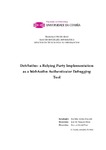DebAuthn: a Relying Party Implementation as a WebAuthn Authenticator Debugging Tool

Use este enlace para citar
http://hdl.handle.net/2183/27256
Excepto si se señala otra cosa, la licencia del ítem se describe como Atribución-NoComercial-SinDerivadas 3.0 España
Colecciones
Metadatos
Mostrar el registro completo del ítemTítulo
DebAuthn: a Relying Party Implementation as a WebAuthn Authenticator Debugging ToolAutor(es)
Directores
Vázquez Naya, José M.Gestal Pose, Marcos
Fecha
2020-09Centro/Dpto/Entidad
Enxeñaría informática, Grao enResumen
[Abstract]
Passwords as an authentication method have become vulnerable to numerous attacks. During
the last few years, the FIDO Alliance and the W3C have been working on a new authentication
method based on public key cryptography and hardware authenticators, which avoids attacks
like phishing or password stealing. This degree thesis focuses on the development of a web
application as a flexible testing and debugging environment for developers and researchers
of the protocol, still under development. Moreover, the developed tool is used for testing the
most relevant hardware authenticators, showcasing their main characteristics. [Resumo]
Os contrasinais como método de autentificación volvéronse vulnerables a numerosos ataques.
Durante os últimos anos, a FIDO Alliance e a W3C estiveron traballando nun novo sistema
de autentificación baseado en criptografía de chave pública e autentificadores hardware,
o que evita ataques como phishing ou roubo de contrasinais. Este traballo de fin de grao
céntrase no desenvolvemento dunha aplicación web como un entorno flexible de probas e
depuración para desenvolvedores e investigadores do protocolo, aínda en desenvolvemento.
Ademais, a ferramenta desenvolvida é usada para probar os autentificadores hardware máis
relevantes, mostrando as súas características principais.
Palabras clave
Authentication
Debugging
Testing
Authenticator
WebAuthn
Autentificación
Depuración
Evaluación
Autentificador
Debugging
Testing
Authenticator
WebAuthn
Autentificación
Depuración
Evaluación
Autentificador
Derechos
Atribución-NoComercial-SinDerivadas 3.0 España






